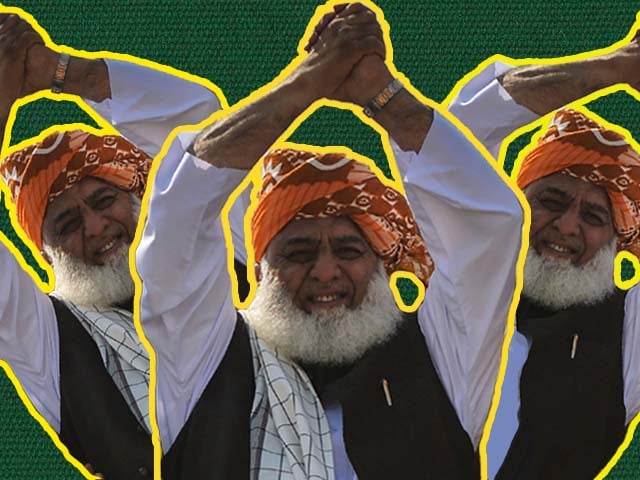
The Maulana and the liberal predicament
Liberals in Pakistan have no leader or party who can espouse their political and social philosophy
The right wing party Jamiat Ulema-e-Islam-Fazl (JUI-F) has now sent an ultimatum to Imran Khan. How this situation transpires over the next couple of days will reveal a lot about not just the parties involved and the establishment but will also shed light upon how various groups in Pakistan view the ‘Azadi march.’ Interestingly, Maulana Fazlur Rehman and his march have found some support from certain liberal corners of the country, at least through social and conventional media, despite the fact that many of these individuals share very little ideological DNA with these parties. Whenever it comes to ‘ideology,’ the religious parties and the establishment are usually on the same page against the liberals of the country. They become united against the former and declare them ‘traitors’, ‘anti-Islam’, and ‘anti-Pakistan.’
But the recent temporary ‘marriage’ between the liberals and the JUI-F provides us with a number of lessons. The liberal class has no united front and lack any leadership in the country, because of which they can never initiate a mass mobilisation. The Pakistan Peoples Party’s (PPP) veneer of liberalism has been crumbling ever since the death of Benazir Bhutto and is now essentially a slogan disseminated from the pulpit which has lead to no tangible change or policy measures. However, keep in mind that the PPP has been succumbing to the pressures from the right wingers ever since the time of Zulfikar Ali Bhutto. Hence, the current face of PPP holds very little appeal for the liberals in Pakistan, however they are searching for someone who will unite with them in their desire to take the charge against Imran Khan.
While Maulana raised issue of Namus e Risalat (SAW) and certain provisions of Constitution defining religion implying that same are under attack due to a Govt conspiracy @BBhuttoZardari stood next to him smiling. Don't preach us tolerance tomorrow if u can't condemn Mualana today pic.twitter.com/dYRs26tHFd
— M. Jibran Nasir 🇵🇸 (@MJibranNasir) November 1, 2019
Therefore, support of the liberals for Rehman indicates the helplessness on the part of the former. Having no leader or party who can champion their beliefs and espouse their political and social philosophy, this group is become increasingly vulnerable in Pakistan, as evidenced by their desperate attempts to find a kind of messiah, either in the uniform of Pervez Musharraf or now in the shape of Rehman. The liberals in the country are thus suffering from inertia, mostly because they have been brought up in considerably comfortable physical and social spaces and therefore shy away from taking to the streets. They have, over time, turned into merely a class of reactionary individuals who have gradually lost the nuance to analyse complex social and political affairs. They continue to view the people of this country in binary terms, with an understanding which fails to see religion as a social, anthropological and political product.
This mending of fences between the liberals and the swathes of men who have currently descended upon Islamabad, though perhaps short lived, does provide a lesson for the deep state of the country. The state has always used right wing parties for their geo-strategic and national political maneuvers. Currently, the deep state has essentially pushed the liberals and the JUI-F up against Imran Khan, resulting in a situation which has now become quite a mess. By having all its eggs in one basket, the deep state has created a deep mess for itself. The ever shrinking space for dissent in the country appears to have brought together the liberals, the secular nationalists and religious groups, but this does not mean that their aims, and the thinking which underpins them, are necessarily aligned.
However, hope can be found in other quarters. The youth, especially from the Pashtun belt, are not only increasingly educated and politically aware but are also more prepared to sustain the hardships which they continue to face. The only mantra used against them is the usual blame that they work for some foreign forces. Yet, it is their ethnic bond and decades long suffering that gives them their strength. Hence, amidst the cacophony of voices which have emerged as a result of the ‘Azadi march,’ perhaps it is the voice of the country’s youth which we should be paying the most attention to.




COMMENTS
Comments are moderated and generally will be posted if they are on-topic and not abusive.
For more information, please see our Comments FAQ